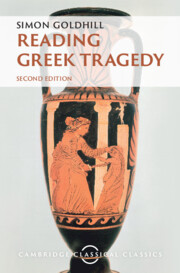Book contents
- Reading Greek Tragedy
- Cambridge Classical Classics
- Reading Greek Tragedy
- Copyright page
- Dedication
- Epigraph
- Contents
- Preface
- Preface to Second Printing
- Re-Reading Reading Greek Tragedy
- Chapter 1 The Drama of Logos
- Chapter 2 The Language of Appropriation
- Chapter 3 The City of Words
- Chapter 4 Relations and Relationships
- Chapter 5 Sexuality and Difference
- Chapter 6 Text and Tradition
- Chapter 7 Mind and Madness
- Chapter 8 Blindness and Insight
- Chapter 9 Sophistry, Philosophy, Rhetoric
- Chapter 10 Genre and Transgression
- Chapter 11 Performance and Performability
- Bibliography
- Index
Chapter 7 - Mind and Madness
Published online by Cambridge University Press: 19 October 2023
- Reading Greek Tragedy
- Cambridge Classical Classics
- Reading Greek Tragedy
- Copyright page
- Dedication
- Epigraph
- Contents
- Preface
- Preface to Second Printing
- Re-Reading Reading Greek Tragedy
- Chapter 1 The Drama of Logos
- Chapter 2 The Language of Appropriation
- Chapter 3 The City of Words
- Chapter 4 Relations and Relationships
- Chapter 5 Sexuality and Difference
- Chapter 6 Text and Tradition
- Chapter 7 Mind and Madness
- Chapter 8 Blindness and Insight
- Chapter 9 Sophistry, Philosophy, Rhetoric
- Chapter 10 Genre and Transgression
- Chapter 11 Performance and Performability
- Bibliography
- Index
Summary
In Chapters 4 and 5, I considered how the tragic texts reflected and disputed the ways in which an individual was placed in society, first in terms of family relations and civic ties as expressed through the vocabulary of philos and ekhthros and secondly in terms of the differences between the sexes. These two chapters were placed between a more general examination of the implications for the tragic texts of the contemporary ideology and structures of the city, and, in Chapter 6, an enquiry into the ways in which the Homeric poems provide an important textual background to the workings of Attic drama. In this chapter, I intend to follow this extensive discussion of what might be called the ‘notion of the self’ with an investigation of the related and important topics of ‘character’ and ‘mind’ which have been brought to the fore in recent critical exchanges not only in classical studies, where the tragic texts have long been the objects of a vigorous debate1 concerning the term ‘character’, but also in modern researches in the philosophy of language, particularly in theories of reading and criticism, where the usefulness and implications for the reading of fiction of the term ‘character’ and the notions of the ‘self’, the ‘subject’ have been the focus of considerable interest.2
- Type
- Chapter
- Information
- Reading Greek Tragedy , pp. 212 - 244Publisher: Cambridge University PressPrint publication year: 2023

